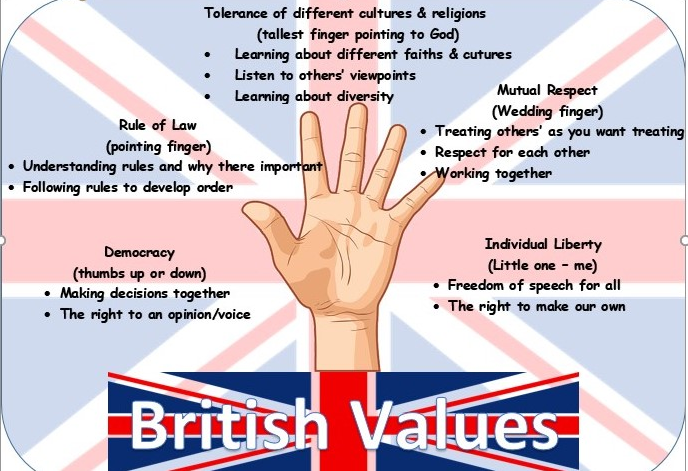British Values
Promoting British Values is an important part of life here at Bacton Primary.
Children remember the five values using their fingers...

How do we teach Democracy?
-
Encourage pupils to become involved in decision-making processes and ensure they are listened to in school, such as through the school council
-
Help pupils to express their views in class and through the use of pupil voice
-
Democracy is shown/taught through history topics and inspirational women in history
-
Provide pupils with a broad general knowledge of, and promote respect for, public institution and services
-
Teach pupils how they can influence decision-making through the democratic process (house captains)
-
Pupils across key stages take part in pupil questionnaires for a range of subjects, especially PSHE
-
Parent views are regularly sought. Suggestions are listened to and taken on board
How do we teach The Rule of Law?
-
Clearly structured and publicised Behavioural Policy
-
Assemblies cover national and international events
-
Visits from outside agencies - e.g. bikeability etc
-
Regular class and school awards and celebration assemblies
-
Class rules, linked to our school’s values
-
Use of praise and rewards to promote positive consequences (tokens etc)
-
Visits from the local public services to talk to the children about being safe and the law. These include, fire service, police officers, road safety units etc.
-
Help pupils to distinguish right from wrong. School council discussions, debating etc
How do we teach Tolerance of Different Faiths and Beliefs?
-
We have high expectations about pupil conduct and understanding of diversity. This is reflected in our Behaviour and Equality policies
-
Pupils are reminded of their place in a culturally diverse society. This is achieved through the Religious Education curriculum
-
Assemblies and class work promote the diversity of society and the right for each person to be respected and valued equally regardless of ability, gender, faith, heritage or ethnicity
-
Diversity is also promoted through music, texts, displays etc
How do we teach Mutual Respect?
-
We all have high expectations of achievement and behaviour. Children and staff are polite and kind
-
We listen and respect each other
-
All members of staff are equally valued
-
Weekly acknowledgements are made of all achievements and awards of the pupils in school
-
Our wide range of sports activities promotes an attitude of equality and fairness
-
Our PSHE/RSE curriculum embodies values of mutual respect
-
We promote respect for individual differences
-
Develop critical personal thinking skills
-
Challenge prejudicial or discriminatory behaviour
-
Assemblies have universal themes of respect and embed our values
-
As part of our RE curriculum each class learns about other faiths and beliefs
-
We consider how some cultures and countries have vulnerable people e.g. homeless people and refugees
How do we teach Individual Liberty?
-
Within school, pupils are actively encouraged to make choices knowing that they are in a safe and supportive environment, this includes regular and high emphasis on online safety
-
Pupils have key roles and responsibilities in the school, including school council, librarians, eco-rangers, house captains, classroom monitors, class ambassadors
-
Assemblies and visual representation of our school values, spread our vision
-
A wide range of extracurricular activities, events, residential trips and visitors enable the children to develop their individuality
-
Implement a strong anti-bullying culture
-
Ongoing visits (including virtual) to other places of worship
-
Openly discussing and celebrating the differences between people such as different faiths, gender, ethnicity and disability






